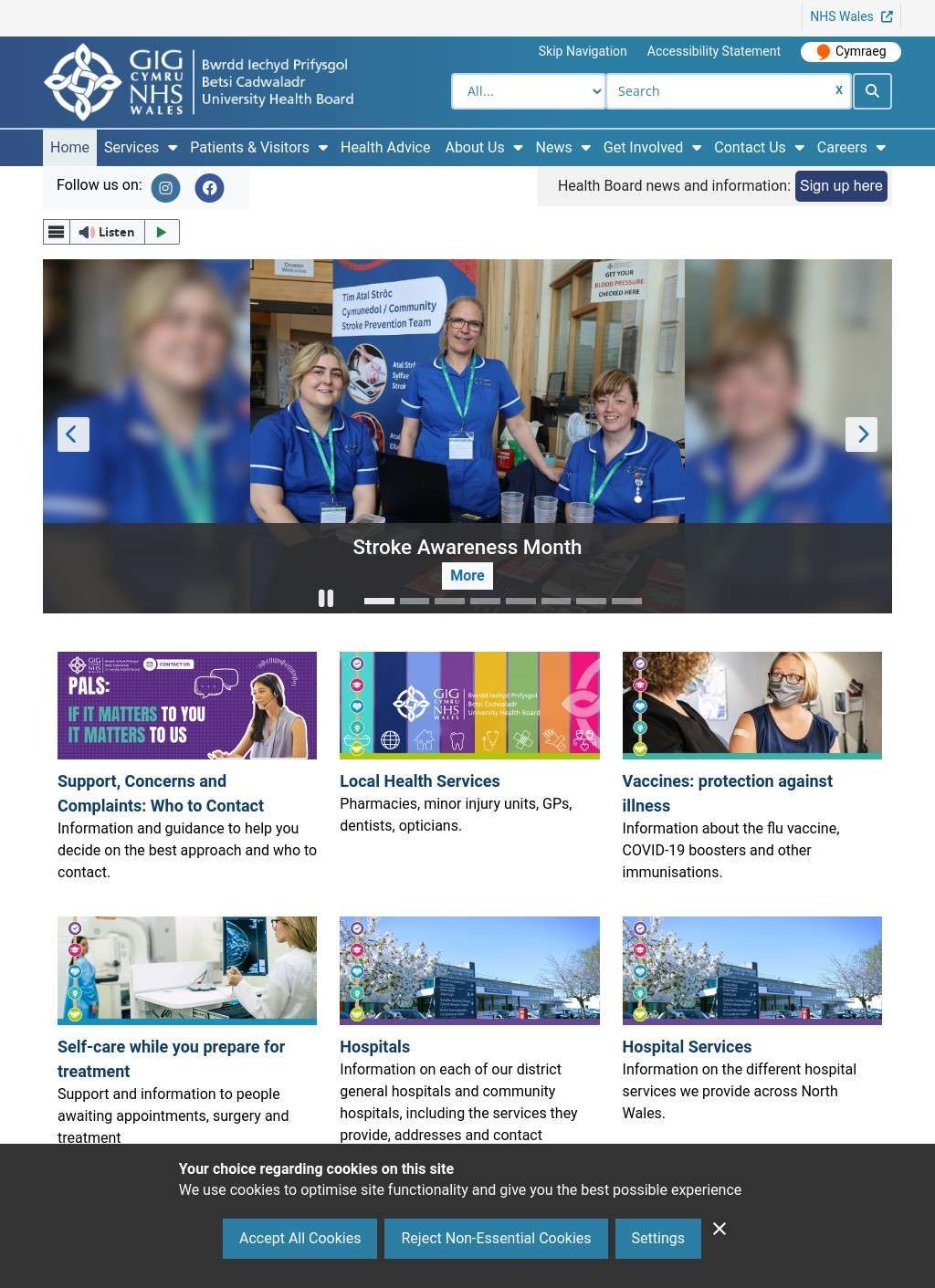Betsi Cadwaladr University Health Board represents Wales' largest health organisation, providing comprehensive NHS services to approximately 694,000 people across North Wales. Named after a pioneering Welsh nurse who served with Florence Nightingale during the Crimean War, this health board covers the six principal areas of Anglesey, Conwy, Denbighshire, Flintshire, Gwynedd, and Wrexham, whilst also serving parts of mid Wales, Cheshire, and Shropshire. The organisation emerged in 2009 from a major reorganisation of NHS Wales, combining the former North Wales NHS Trust and North West Wales NHS Trust with six local health boards.
The health board operates an extensive network of healthcare facilities, including three major district general hospitals at Ysbyty Gwynedd in Bangor, Ysbyty Glan Clwyd in Bodelwyddan, and Wrexham Maelor Hospital. Beyond these flagship sites, the organisation manages 22 other acute and community hospitals, creating a comprehensive healthcare infrastructure across the region. Community healthcare delivery happens through more than 90 health centres, clinics, community health team bases, and mental health units, ensuring services remain accessible to rural and urban populations alike.
Primary care coordination forms a fundamental aspect of the health board's responsibilities, overseeing 94 GP practices and working with hundreds of community pharmacies, dental practices, and optometry services. This integrated approach ensures patients can access appropriate care at the right level, whether that's routine health maintenance through their family doctor or specialist treatment at a major hospital. The organisation's website serves as a crucial navigation tool, helping patients find local services, book appointments, and understand care pathways for various conditions.
Mental health services receive particular focus within the organisation's structure, reflecting growing recognition of psychological wellbeing's importance. Services range from community mental health teams providing early intervention and ongoing support to specialist inpatient units for those experiencing acute episodes. Child and Adolescent Mental Health Services (CAMHS) address young people's specific needs, whilst older adult mental health services tackle conditions like dementia with dedicated memory clinics and support programmes. The integration of mental and physical health services represents a key strategic priority.
Emergency and urgent care services operate round the clock across multiple sites, with major emergency departments handling everything from minor injuries to life-threatening conditions. The organisation has developed Minor Injury Units in smaller communities, reducing pressure on main emergency departments whilst providing faster treatment for less serious conditions. Ambulance services, coordinated with the Welsh Ambulance Service NHS Trust, ensure rapid response to medical emergencies throughout this geographically challenging region.
Specialist services extend beyond routine healthcare, with centres of excellence in areas such as cardiac care, cancer treatment, and neurology. The health board's teaching hospital status supports medical education and research, partnering with Bangor University and other institutions to train the next generation of healthcare professionals. This academic connection drives innovation in patient care, with research programmes exploring new treatments and care models that could benefit patients across Wales and beyond.
Digital transformation increasingly shapes service delivery, with online appointment booking, electronic prescriptions, and virtual consultations becoming standard features. The health board's website provides extensive health information resources, helping patients understand conditions, treatments, and self-care options. During the COVID-19 pandemic, rapid digital adoption proved essential for maintaining services, and many innovations have become permanent features of healthcare delivery.
Community engagement remains central to the organisation's approach, with regular public meetings, consultation exercises, and patient feedback mechanisms shaping service development. The health board maintains various participation groups where patients, carers, and community representatives can influence healthcare planning. WhatsApp channels and social media platforms provide modern communication routes, complementing traditional engagement methods to reach diverse audiences across North Wales.
Workforce challenges mirror those facing the NHS throughout the UK, with recruitment and retention requiring innovative approaches. The health board employs approximately 19,000 staff, making it North Wales' largest employer. Professional development programmes, Welsh language training, and flexible working arrangements help attract and retain skilled professionals in what can be a competitive market, particularly for specialist roles in rural areas.
Welsh language services are embedded throughout the organisation, recognising that many patients, particularly elderly ones, prefer receiving care in their first language. The "More than just words" strategy ensures Welsh speakers can access services in Welsh from first contact through to discharge, with bilingual signage, documentation, and staff training supporting this commitment. This linguistic sensitivity extends to other community languages, with interpretation services available for the region's diverse population.
Quality improvement initiatives drive continuous enhancement of patient care, with regular audits, peer reviews, and patient safety programmes identifying areas for development. The health board publishes performance data transparently, including waiting times, infection rates, and patient satisfaction scores. When services fall short of expected standards, improvement plans are developed with external oversight from Healthcare Inspectorate Wales and other regulatory bodies.
Financial sustainability presents ongoing challenges, with demand for services growing faster than available resources. The health board manages an annual budget exceeding £1.7 billion, requiring careful prioritisation to maintain essential services whilst investing in improvements. Efficiency programmes seek to eliminate waste and improve productivity, though these must balance with maintaining care quality and staff wellbeing. Public board meetings discuss financial performance openly, ensuring accountability for public funds.
Contact mechanisms cater to diverse needs and preferences, from traditional telephone switchboards at major hospitals to sophisticated online portals for specific services. The central website acts as a gateway, directing patients to appropriate contact points for their specific needs. Emergency contacts are prominently displayed, whilst routine enquiry routes are clearly explained. Complaints and concerns procedures are transparently outlined, with Patient Advice and Liaison Services (PALS) offering support to those experiencing difficulties navigating the healthcare system. The organisation's commitment to continuous improvement means patient feedback directly influences service development, ensuring healthcare delivery evolves to meet North Wales' changing needs.
